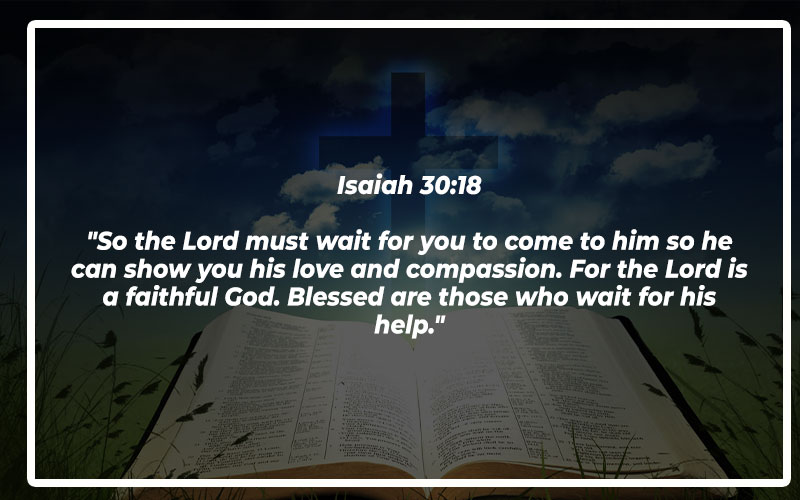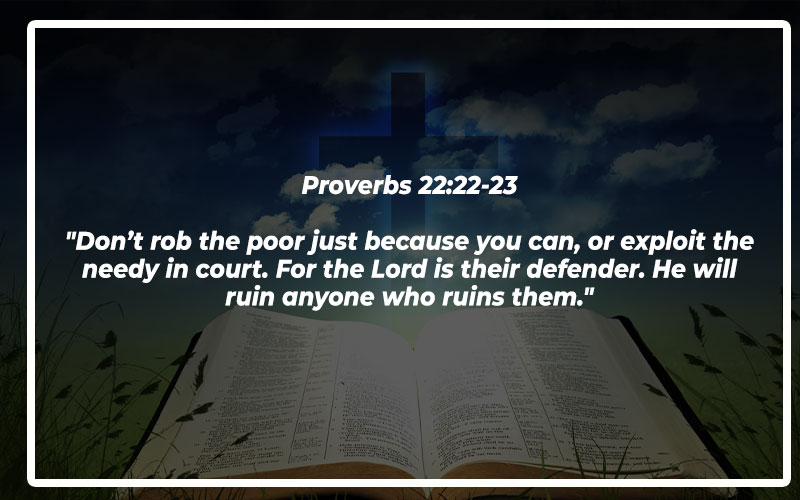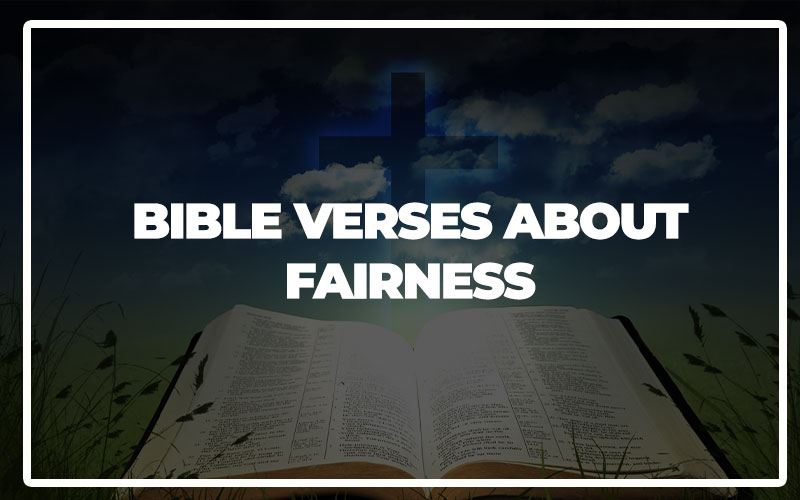Fairness is a principle deeply rooted in the teachings of the Bible. God calls us to treat others with justice, equity, and compassion. Fairness in our actions reflects God’s character and His desire for us to live in peace and harmony with one another. In this article, we explore key Bible verses that shed light on the importance of fairness and how we can embody it in our lives.
Also Read: Bible Verses About Uniqueness
God’s Justice and Fairness
God’s nature is just and fair. As believers, we are called to reflect His justice in our interactions. The Bible consistently reminds us that fairness is central to God’s character and that we are to mirror His example in how we treat others.
Isaiah 30:18
“So the Lord must wait for you to come to him so he can show you his love and compassion. For the Lord is a faithful God. Blessed are those who wait for his help.”

This verse highlights God’s fairness and compassion, reminding us that His justice is not rushed but perfectly timed. We are encouraged to trust in His fairness, knowing that His timing is always right and beneficial for us.
Psalm 89:14
“Righteousness and justice are the foundation of your throne. Unfailing love and truth walk before you as attendants.”
The foundation of God’s rule is built on righteousness and justice, emphasizing the critical importance of fairness. His governance is characterized by truth and love, showing us how fairness is integral to His nature.
Proverbs 21:3
“The Lord is more pleased when we do what is right and just than when we offer him sacrifices.”
Fairness is a greater delight to God than ritual offerings. This verse teaches us that living justly and practicing fairness in our everyday lives is more valuable than performing religious ceremonies. It calls for ethical living over mere formalities.
Deuteronomy 32:4
“He is the Rock; his deeds are perfect. Everything he does is just and fair. He is a faithful God who does no wrong; how just and upright he is!”
God’s nature is one of absolute fairness. This verse emphasizes that all of His ways are perfect and just, reminding us to trust in His fairness even when we do not fully understand His ways.
Psalm 98:9
“For the Lord is coming to judge the earth. He will judge the world with justice, and the nations with fairness.”
This verse reassures us of God’s fairness in His final judgment. His justice will be extended to all nations, and everyone will be judged with fairness and equity. It reminds us of the ultimate justice that will be delivered by God.
Fairness in Our Relationships
The Bible calls us to practice fairness in our relationships. Whether it’s in our families, friendships, or interactions with others, God expects us to treat each other justly, with honesty and respect. These verses highlight the importance of fairness in our personal connections.
Luke 6:31
“Do to others as you would like them to do to you.”
This verse, often called the Golden Rule, is a call to fairness in our treatment of others. It encourages us to consider how we want to be treated and to extend that same fairness to those around us.
James 2:1
“My dear brothers and sisters, how can you claim to have faith in our glorious Lord Jesus Christ if you favor some people over others?”
Favoritism and unfair treatment have no place in the Christian life. This verse warns us against partiality and encourages fairness in our dealings with others, especially within the community of believers.
Proverbs 31:9
“Yes, speak up for the poor and helpless, and see that they get justice.”
This verse reminds us to advocate for fairness, especially for those who cannot defend themselves. It calls us to use our voice to ensure that justice and fairness are extended to the marginalized and vulnerable.
Leviticus 19:15
“Do not twist justice in legal matters by favoring the poor or being partial to the rich and powerful. Always judge people fairly.”
This verse commands fairness in judgment, regardless of social status. Whether rich or poor, everyone is to be treated equally and fairly in all matters, especially in legal contexts. It emphasizes impartiality as a key component of fairness.
Colossians 3:25
“But if you do what is wrong, you will be paid back for the wrong you have done. For God has no favorites.”
God’s fairness extends to how He deals with wrongdoing. This verse reminds us that there are consequences for our actions and that God’s justice applies equally to all, without favoritism. It calls us to live in integrity, knowing we will be held accountable.
Fairness in Leadership
Fairness is a crucial quality for anyone in a position of leadership. The Bible instructs leaders to exercise their authority with justice, showing no favoritism and ensuring that fairness is maintained in their decision-making. The following verses reflect God’s heart for fairness in leadership.
Proverbs 16:12
“A king detests wrongdoing, for his rule is built on justice.”
This verse highlights that true leadership is based on justice and fairness. Leaders who act justly will have the trust and respect of their people. Fairness should be the foundation upon which all leadership decisions are made.
Micah 6:8
“No, O people, the Lord has told you what is good, and this is what he requires of you: to do what is right, to love mercy, and to walk humbly with your God.”
This verse calls for fairness, mercy, and humility in our actions. It is a reminder to leaders and individuals alike to act justly, extending fairness and compassion in every decision. It reflects God’s desire for justice to prevail in all walks of life.
Exodus 18:21
“But select from all the people some capable, honest men who fear God and hate bribes. Appoint them as leaders over groups of one thousand, one hundred, fifty, and ten.”
This verse speaks to the necessity of appointing fair and honest leaders. Leaders who are impartial, God-fearing, and free from corruption are critical to ensuring fairness in governance and leadership. Integrity is key to fairness in leadership.
Psalm 72:4
“Help him to defend the poor, to rescue the children of the needy, and to crush their oppressors.”
This verse reveals God’s heart for fairness, especially towards the vulnerable. Leaders are called to protect the poor and oppressed, ensuring fairness for those who are often disregarded. This reflects God’s care for justice and equity in leadership.
Romans 2:11
“For God does not show favoritism.”
God’s fairness is a model for all leaders. This verse teaches that God does not play favorites, and leaders are encouraged to follow His example by treating everyone equally and fairly, regardless of their position or status.
Also Read: Bible Verses About Being Different
Fairness in Business
The Bible places great emphasis on fairness in our business dealings. Whether in trade, employment, or any kind of financial transaction, integrity and fairness should guide our decisions. These verses underscore the importance of being honest and just in the marketplace.
Leviticus 19:13
“Do not defraud or rob your neighbor. Do not make your hired workers wait until the next day to receive their pay.”
This verse highlights the importance of fairness in paying workers on time. It teaches us that fairness is not just about being honest but also about ensuring that others are treated with respect and paid fairly for their labor.
Proverbs 11:1
“The Lord detests the use of dishonest scales, but he delights in accurate weights.”
Fairness in business is key to honoring God. This verse speaks against dishonest practices in trade and emphasizes that God takes delight in fairness and integrity. It is a call for honesty in all business dealings.
Deuteronomy 25:13-15
“You must use accurate scales when you weigh out merchandise, and you must use full and honest measures. Yes, always use honest weights and measures, so that you may enjoy a long life in the land the Lord your God is giving you.”
In this passage, God commands fairness in trade, warning against the use of dishonest measures. It teaches that fair business practices lead to blessings and longevity, while dishonesty brings about disfavor.
Jeremiah 22:13
“And the Lord says, ‘What sorrow awaits Jehoiakim, who builds his palace with forced labor. He builds injustice into its walls, for he makes his neighbors work for nothing, he does not pay them for their labor.’”
This verse is a warning against exploiting others in business. It condemns those who unjustly withhold wages and reminds us that God’s justice is for all, particularly those who are wronged or oppressed.
Colossians 4:1
“Masters, be just and fair to your slaves. Remember that you also have a Master in heaven.”
Even those in positions of authority are called to fairness. This verse reminds employers and leaders that they are accountable to God for how they treat their workers. Fairness should govern all employer-employee relationships.
Fairness to the Poor and Oppressed
God has a special concern for the poor and oppressed, and He commands us to ensure fairness and justice for them. The Bible encourages us to care for the vulnerable and to act fairly on their behalf, demonstrating God’s love through our actions.
Proverbs 22:22-23
“Don’t rob the poor just because you can, or exploit the needy in court. For the Lord is their defender. He will ruin anyone who ruins them.”

This passage warns against exploiting the poor and promises God’s defense for those who are treated unfairly. It serves as a reminder that God sees injustice and will stand up for those who cannot stand up for themselves.
Isaiah 1:17
“Learn to do good. Seek justice. Help the oppressed. Defend the cause of orphans. Fight for the rights of widows.”
This verse calls us to take active steps to seek justice and fairness, particularly for those who are oppressed or marginalized. It is a call to engage in the work of advocacy and fairness on behalf of the vulnerable in society.
Psalm 82:3
“Give justice to the poor and the orphan; uphold the rights of the oppressed and the destitute.”
This verse emphasizes our responsibility to ensure fairness for the poor, orphans, and oppressed. It calls us to actively support the rights of those who are vulnerable, embodying God’s justice and fairness in our communities.
Zechariah 7:9-10
“This is what the Lord of Heaven’s Armies says: Judge fairly, and show mercy and kindness to one another. Do not oppress widows, orphans, foreigners, and the poor. And do not scheme against each other.”
God commands us to judge fairly and to extend kindness to others, especially to those who are often marginalized. This passage reminds us that fairness is not only about what we do in formal judgments but also in how we treat others in everyday life.
Amos 5:24
“Instead, I want to see a mighty flood of justice, an endless river of righteous living.”
Here, God expresses His desire for a society where justice flows freely. Fairness is not just about isolated acts of justice but about creating a system where fairness and righteousness are the norm. It calls for a commitment to living justly in all aspects of life.
Fairness in Forgiveness and Mercy
Fairness is not only about giving people what they deserve but also about showing mercy and forgiveness. The Bible teaches that God is both just and merciful, and we are called to extend that same balance of fairness and mercy in our relationships.
Matthew 6:14-15
“If you forgive those who sin against you, your heavenly Father will forgive you. But if you refuse to forgive others, your Father will not forgive your sins.”
This passage highlights the fairness in God’s kingdom when it comes to forgiveness. God’s fairness extends to us in that He forgives us, but it is equally fair that we are expected to forgive others. It teaches us to balance justice with mercy.
Luke 6:37
“Do not judge others, and you will not be judged. Do not condemn others, or it will all come back against you. Forgive others, and you will be forgiven.”
This verse emphasizes fairness in our judgments of others. We are called to extend the same forgiveness and mercy to others that we wish to receive. It teaches us that fairness is about showing grace and not being quick to condemn.
James 2:13
“There will be no mercy for those who have not shown mercy to others. But if you have been merciful, God will be merciful when he judges you.”
Here, James highlights the principle of fairness in God’s judgment. Mercy is a critical part of fairness, and we are reminded that our willingness to show mercy directly affects how we will be judged. Fairness requires both justice and compassion.
Colossians 3:13
“Make allowance for each other’s faults, and forgive anyone who offends you. Remember, the Lord forgave you, so you must forgive others.”
This verse teaches that fairness is not about perfection but about making room for the imperfections of others. It calls for forgiveness as a way of ensuring that fairness in relationships is grounded in grace and love.
Matthew 18:21-22
“Then Peter came to him and asked, ‘Lord, how often should I forgive someone who sins against me? Seven times?’ ‘No, not seven times,’ Jesus replied, ‘but seventy times seven!'”
Jesus teaches that fairness in forgiveness is abundant and generous. This passage encourages us to forgive others without limit, showing that true fairness involves a constant willingness to extend grace and mercy, just as God does for us.
Also Read: Bible Verses About Maturity
What Does the Bible Say About Fairness
The Bible teaches us a lot about fairness. Fairness means treating people equally and doing what is right, no matter who they are. It’s about giving everyone a fair chance and not showing favoritism. This is something God wants us to practice in our everyday lives.
God is fair, and He created all people equally. He doesn’t treat anyone better than the other, whether they are rich or poor, young or old. He sees everyone the same and expects us to do the same. When we act fairly, we are showing that we understand His ways and that we care about others just like He does.
Fairness also means not taking advantage of others. It is wrong to cheat, lie, or take what does not belong to us. We should deal honestly with everyone, whether in school, at work, or in our families. If we want fairness, we must give fairness.
Sometimes, life does not feel fair. Bad things happen to good people, and good things happen to those who do wrong. It’s easy to feel upset when we see this, but the Bible reminds us to trust in God. He sees everything and will make things right in His time. Even when things seem unfair now, we can have faith that God’s fairness will win in the end.
As followers of Christ, we are called to be fair in how we treat others. We should show kindness, avoid judging people based on appearances, and always seek to do what is right. When we live with fairness in our hearts, we reflect God’s love and justice to the world.

